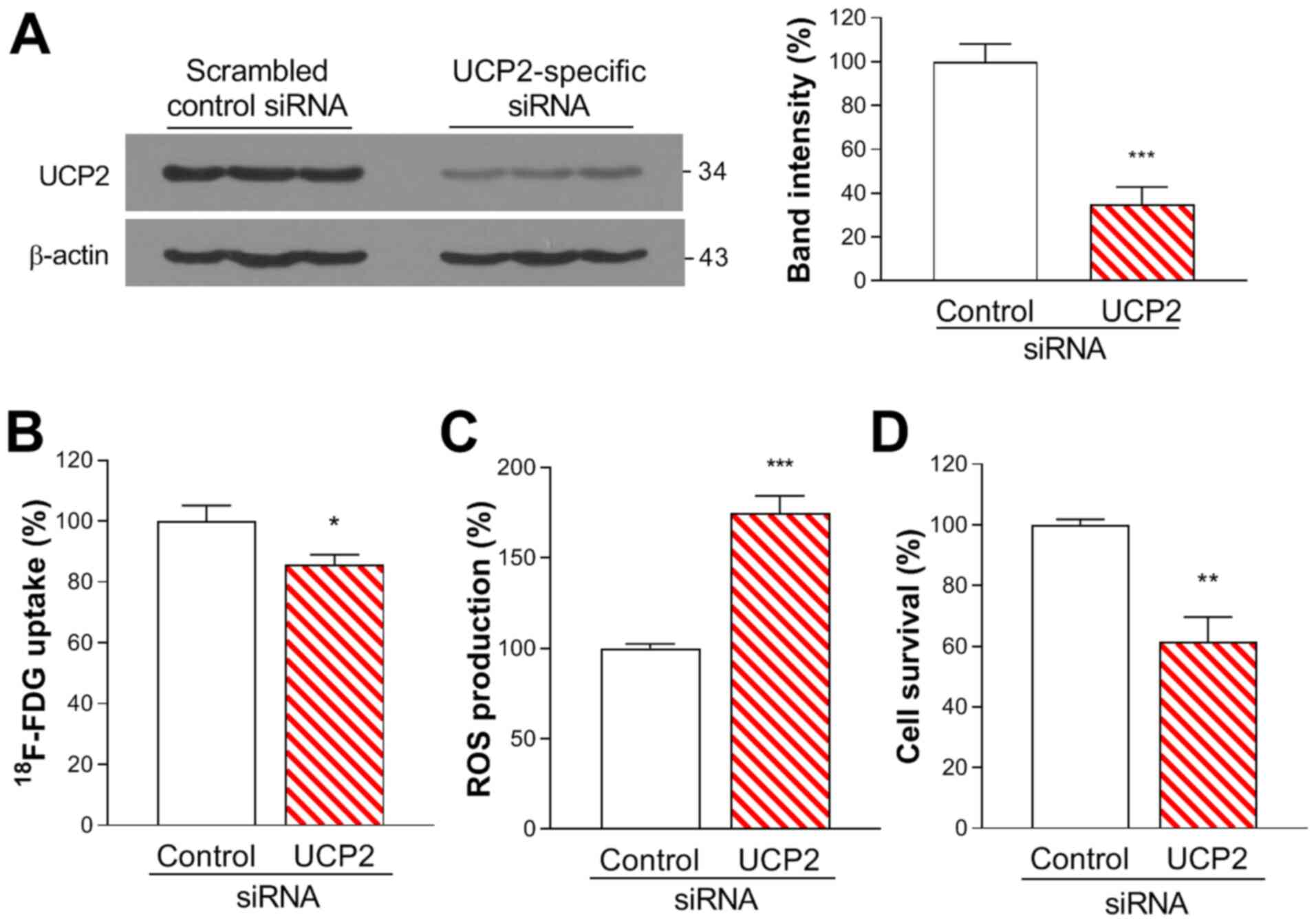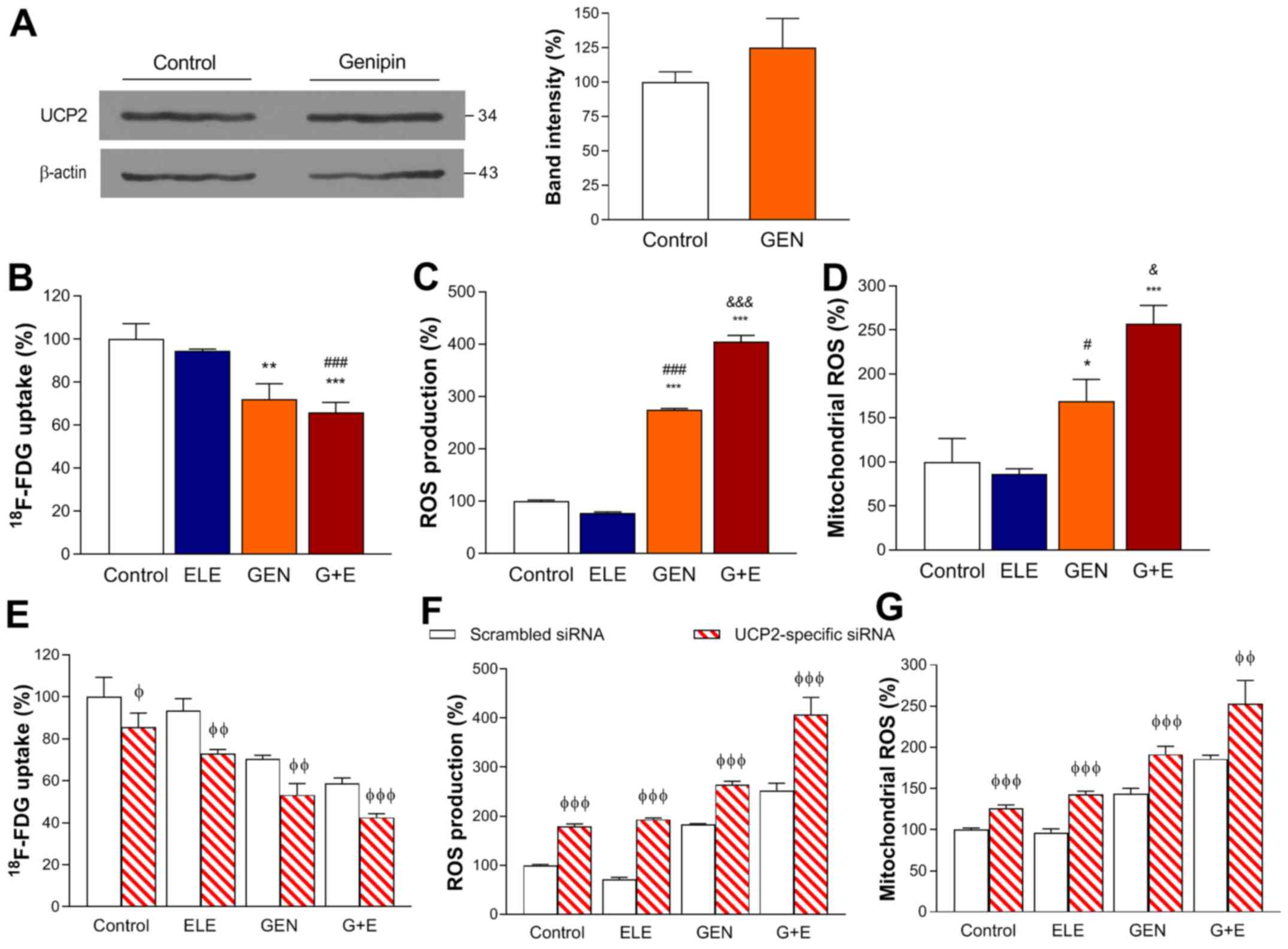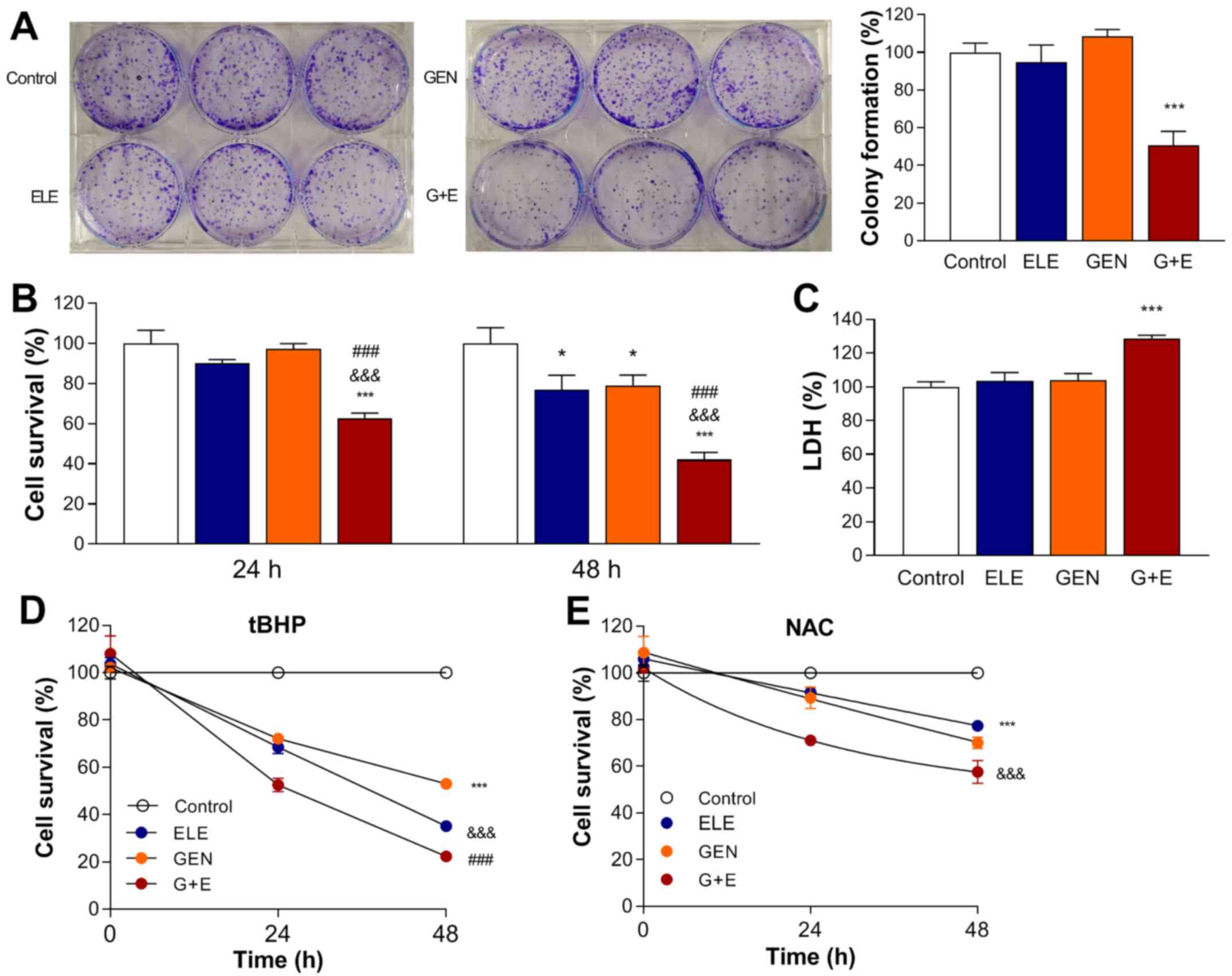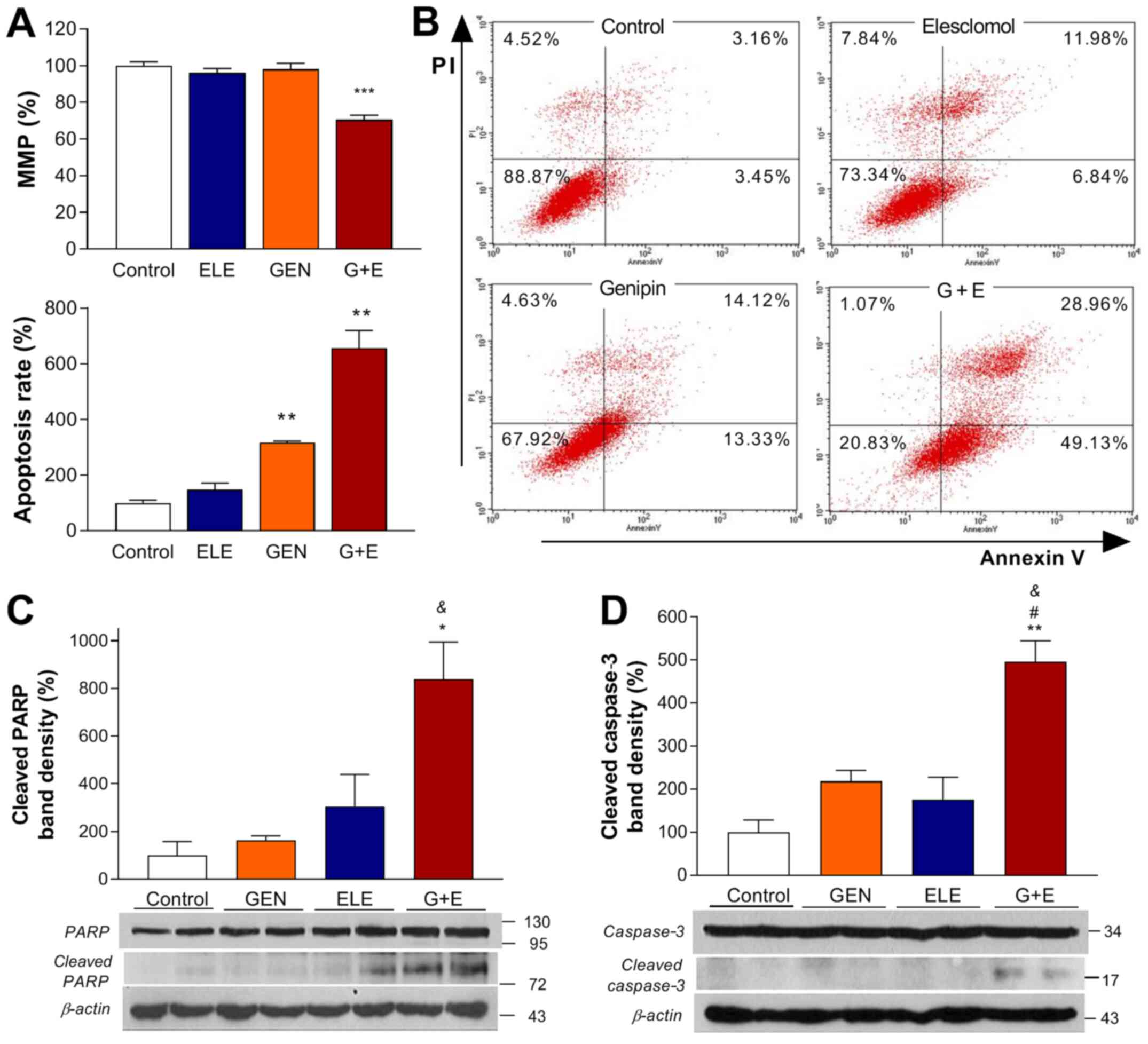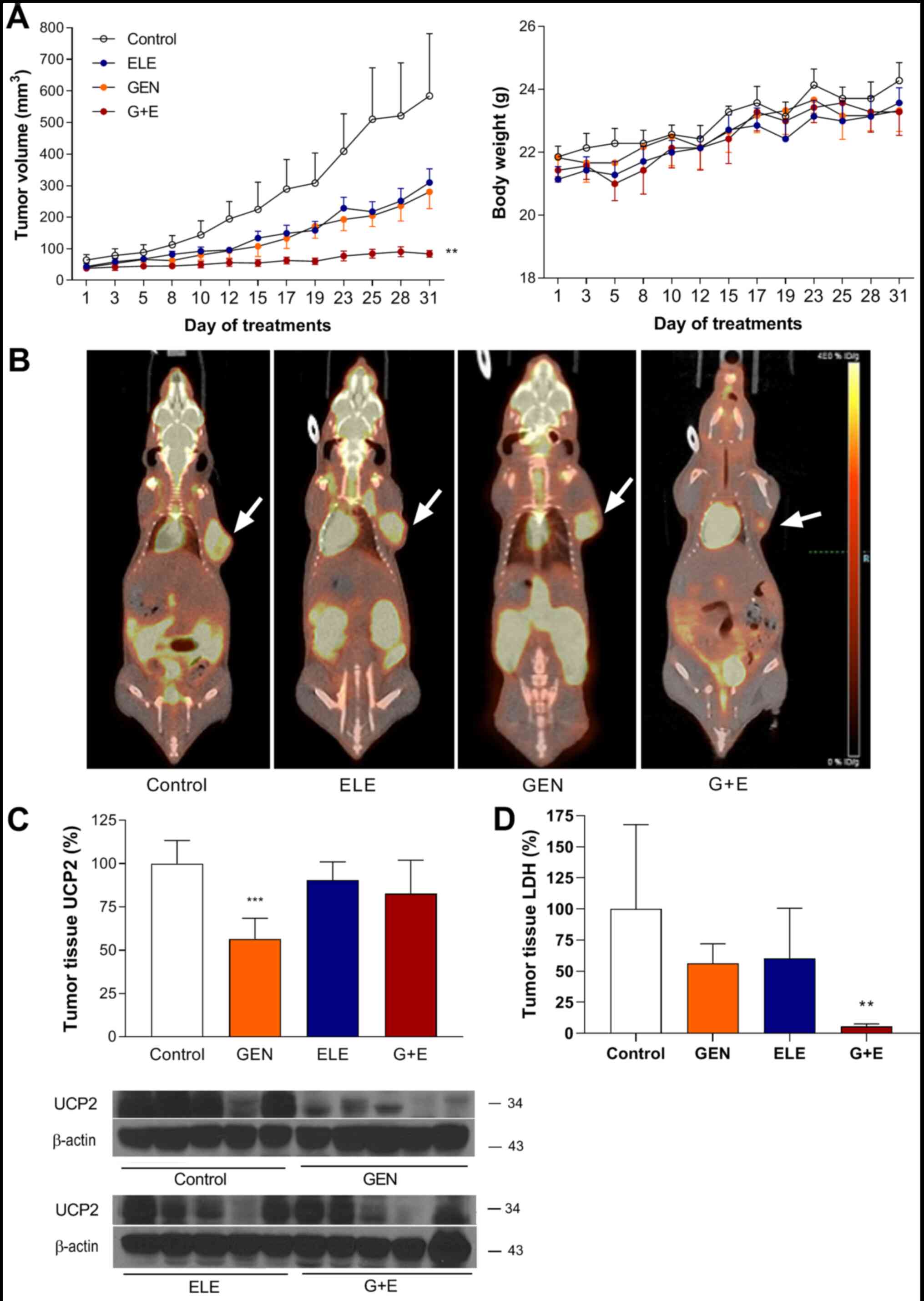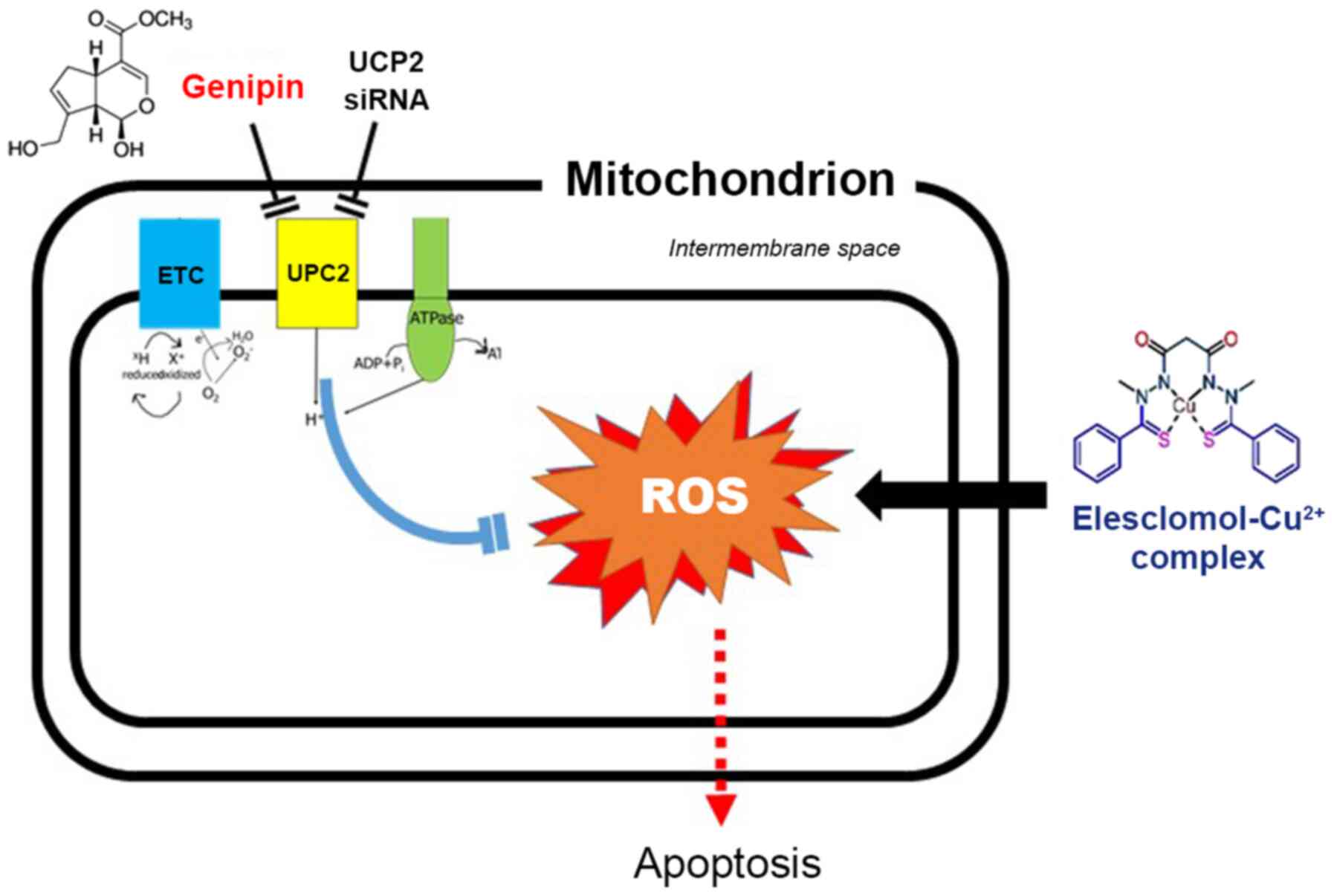|
1
|
Chandel NS: Mitochondria as signaling
organelles. BMC Biol. 12:342014. View Article : Google Scholar : PubMed/NCBI
|
|
2
|
Vyas S, Zaganjor E and Haigis MC:
Mitochondria and cancer. Cell. 166:555–566. 2016. View Article : Google Scholar : PubMed/NCBI
|
|
3
|
Berkenblit A, Eder JP Jr, Ryan DP, Seiden
MV, Tatsuta N, Sherman ML, Dahl TA, Dezube BJ and Supko JG: Phase I
clinical trial of STA-4783 in combination with paclitaxel in
patients with refractory solid tumors. Clin Cancer Res. 13:584–590.
2007. View Article : Google Scholar : PubMed/NCBI
|
|
4
|
Kirshner JR, He S, Balasubramanyam V,
Kepros J, Yang CY, Zhang M, Du Z, Barsoum J and Bertin J:
Elesclomol induces cancer cell apoptosis through oxidative stress.
Mol Cancer Ther. 7:2319–2327. 2008. View Article : Google Scholar : PubMed/NCBI
|
|
5
|
Blackman RK, Cheung-Ong K, Gebbia M, Proia
DA, He S, Kepros J, Jonneaux A, Marchetti P, Kluza J, Rao PE, et
al: Mitochondrial electron transport is the cellular target of the
oncology drug elesclomol. PLoS One. 7:e297982012. View Article : Google Scholar : PubMed/NCBI
|
|
6
|
Vander Heiden MG, Cantley LC and Thompson
CB: Understanding the Warburg effect: The metabolic requirements of
cell proliferation. Science. 324:1029–1033. 2009. View Article : Google Scholar : PubMed/NCBI
|
|
7
|
Wangpaichitr M, Sullivan EJ,
Theodoropoulos G, Wu C, You M, Feun LG, Lampidis TJ, Kuo MT and
Savaraj N: The relationship of thioredoxin-1 and cisplatin
resistance: Its impact on ROS and oxidative metabolism in lung
cancer cells. Mol Cancer Ther. 11:604–615. 2012. View Article : Google Scholar : PubMed/NCBI
|
|
8
|
Arsenijevic D, Onuma H, Pecqueur C,
Raimbault S, Manning BS, Miroux B, Couplan E, Alves-Guerra MC,
Goubern M, Surwit R, et al: Disruption of the uncoupling protein-2
gene in mice reveals a role in immunity and reactive oxygen species
production. Nat Genet. 26:435–439. 2000. View Article : Google Scholar : PubMed/NCBI
|
|
9
|
Zhang CY, Parton LE, Ye CP, Krauss S, Shen
R, Lin CT, Porco JA Jr and Lowell BB: Genipin inhibits
UCP2-mediated proton leak and acutely reverses obesity- and high
glucose-induced beta cell dysfunction in isolated pancreatic
islets. Cell Metab. 3:417–427. 2006. View Article : Google Scholar : PubMed/NCBI
|
|
10
|
Ayyasamy V, Owens KM, Desouki MM, Liang P,
Bakin A, Thangaraj K, Buchsbaum DJ, LoBuglio AF and Singh KK:
Cellular model of Warburg effect identifies tumor promoting
function of UCP2 in breast cancer and its suppression by genipin.
PLoS One. 6:e247922011. View Article : Google Scholar : PubMed/NCBI
|
|
11
|
Kuai XY, Ji ZY and Zhang HJ: Mitochondrial
uncoupling protein 2 expression in colon cancer and its clinical
significance. World J Gastroenterol. 16:5773–5778. 2010. View Article : Google Scholar : PubMed/NCBI
|
|
12
|
Diano S and Horvath TL: Mitochondrial
uncoupling protein 2 (UCP2) in glucose and lipid metabolism. Trends
Mol Med. 18:52–58. 2012. View Article : Google Scholar : PubMed/NCBI
|
|
13
|
Donadelli M, Dando I, Dalla Pozza E and
Palmieri M: Mitochondrial uncoupling protein 2 and pancreatic
cancer: A new potential target therapy. World J Gastroenterol.
21:3232–3238. 2015. View Article : Google Scholar : PubMed/NCBI
|
|
14
|
Michael A: Pitt: Overexpression of
uncoupling protein-2 in cancer: metabolic and heat changes,
inhibition and effects on drug resistance. Inflammopharmacol.
23:365–369. 2015. View Article : Google Scholar
|
|
15
|
Derdak Z, Mark NM, Beldi G, Robson SC,
Wands JR and Baffy G: The mitochondrial uncoupling protein-2
promotes chemoresistance in cancer cells. Cancer Res. 68:2813–2819.
2008. View Article : Google Scholar : PubMed/NCBI
|
|
16
|
Derdák Z, Fülöp P, Sabo E, Tavares R,
Berthiaume EP, Resnick MB, Paragh G, Wands JR and Baffy G: Enhanced
colon tumor induction in uncoupling protein-2 deficient mice is
associated with NF-kappaB activation and oxidative stress.
Carcinogenesis. 27:956–961. 2006. View Article : Google Scholar : PubMed/NCBI
|
|
17
|
Santandreu FM, Roca P and Oliver J:
Uncoupling protein-2 knockdown mediates the cytotoxic effects of
cisplatin. Free Radic Biol Med. 49:658–666. 2010. View Article : Google Scholar : PubMed/NCBI
|
|
18
|
Kim BC, Kim HG, Lee SA, Lim S, Park EH,
Kim S-J and Lim CJ: Genipin-induced apoptosis in hepatoma cells is
mediated by reactive oxygen species/c-Jun NH2-terminal
kinase-dependent activation of mitochondrial pathway. Biochem
Pharmacol. 70:1398–1407. 2005. View Article : Google Scholar : PubMed/NCBI
|
|
19
|
Mailloux RJ, Adjeitey CN and Harper ME:
Genipin-induced inhibition of uncoupling protein-2 sensitizes
drug-resistant cancer cells to cytotoxic agents. PLoS One.
5:e132892010. View Article : Google Scholar : PubMed/NCBI
|
|
20
|
Khanal T, Kim HG, Choi JH, Do MT, Kong MJ,
Kang MJ, Noh K, Yeo HK, Ahn YT, Kang W, et al: Biotransformation of
geniposide by human intestinal microflora on cytotoxicity against
HepG2 cells. Toxicol Lett. 209:246–254. 2012. View Article : Google Scholar : PubMed/NCBI
|
|
21
|
Kalemkerian GP: Combination chemotherapy
for relapsed small-cell lung cancer. Lancet Oncol. 17:1033–1035.
2016. View Article : Google Scholar : PubMed/NCBI
|
|
22
|
Li Y, Atkinson K and Zhang T: Combination
of chemotherapy and cancer stem cell targeting agents: Preclinical
and clinical studies. Cancer Lett. 396:103–109. 2017. View Article : Google Scholar : PubMed/NCBI
|
|
23
|
Wang N, Zhu M, Tsao SW, Man K, Zhang Z and
Feng Y: Up-regulation of TIMP-1 by genipin inhibits MMP-2
activities and suppresses the metastatic potential of human
hepatocellular carcinoma. PLoS One. 7:e463182012. View Article : Google Scholar : PubMed/NCBI
|
|
24
|
Gehrmann M: Drug evaluation: STA-4783 -
enhancing taxane efficacy by induction of Hsp70. Curr Opin Investig
Drugs. 7:574–580. 2006.PubMed/NCBI
|
|
25
|
Nagai M, Vo NH, Shin Ogawa L, Chimmanamada
D, Inoue T, Chu J, Beaudette-Zlatanova BC, Lu R, Blackman RK,
Barsoum J, et al: The oncology drug elesclomol selectively
transports copper to the mitochondria to induce oxidative stress in
cancer cells. Free Radic Biol Med. 52:2142–2150. 2012. View Article : Google Scholar : PubMed/NCBI
|
|
26
|
Wangpaichitr M, Wu C, You M, Maher JC,
Dinh V, Feun LG and Savaraj N:
N,N-Dimethyl-N′,N-bis(phenylcarbonothioyl) propanedihydrazide
(elesclomol) selectively kills cisplatin resistant lung cancer
cells through reactive oxygen species (ROS). Cancers (Basel).
1:23–38. 2009. View Article : Google Scholar : PubMed/NCBI
|
|
27
|
Feng Q, Cao HL, Xu W, Li XR, Ren YQ and Du
LF: Apoptosis induced by genipin in human leukemia K562 cells:
Involvement of c-Jun N-terminal kinase in G2/M arrest.
Acta Pharmacol Sin. 32:519–527. 2011. View Article : Google Scholar : PubMed/NCBI
|
|
28
|
Valle A, Oliver J and Roca P: Role of
uncoupling proteins in cancer. Cancers (Basel). 2:567–591. 2010.
View Article : Google Scholar : PubMed/NCBI
|
|
29
|
Zhou H, Zhao J and Zhang X: Inhibition of
uncoupling protein 2 by genipin reduces insulin-stimulated glucose
uptake in 3T3-L1 adipocytes. Arch Biochem Biophys. 486:88–93. 2009.
View Article : Google Scholar : PubMed/NCBI
|
|
30
|
Dando I, Fiorini C, Pozza ED, Padroni C,
Costanzo C, Palmieri M and Donadelli M: UCP2 inhibition triggers
ROS-dependent nuclear translocation of GAPDH and autophagic cell
death in pancreatic adenocarcinoma cells. Biochim Biophys Acta.
1833:672–679. 2013. View Article : Google Scholar : PubMed/NCBI
|
|
31
|
Cho YS, Lee JH, Jung K-H, Park JW, Moon
SH, Choe YS and Lee KH: Molecular mechanism of (18)F-FDG uptake
reduction induced by genipin in T47D cancer cell and role of
uncoupling protein-2 in cancer cell glucose metabolism. Nucl Med
Biol. 43:587–592. 2016. View Article : Google Scholar : PubMed/NCBI
|
|
32
|
Brandi J, Cecconi D, Cordani M,
Torrens-Mas M, Pacchiana R, Dalla Pozza E, Butera G, Manfredi M,
Marengo E, Oliver J, et al: The antioxidant uncoupling protein 2
stimulates hnRNPA2/B1, GLUT1 and PKM2 expression and sensitizes
pancreas cancer cells to glycolysis inhibition. Free Radic Biol
Med. 101:305–316. 2016. View Article : Google Scholar : PubMed/NCBI
|
|
33
|
Su WP, Lo YC, Yan JJ, Liao IC, Tsai PJ,
Wang HC, Yeh HH, Lin CC, Chen HH, Lai WW, et al: Mitochondrial
uncoupling protein 2 regulates the effects of paclitaxel on Stat3
activation and cellular survival in lung cancer cells.
Carcinogenesis. 33:2065–2075. 2012. View Article : Google Scholar : PubMed/NCBI
|
|
34
|
Horimoto M, Resnick MB, Konkin TA,
Routhier J, Wands JR and Baffy G: Expression of uncoupling
protein-2 in human colon cancer. Clin Cancer Res. 10:6203–6207.
2004. View Article : Google Scholar : PubMed/NCBI
|
|
35
|
Harper ME, Antoniou A, Villalobos-Menuey
E, Russo A, Trauger R, Vendemelio M, George A, Bartholomew R, Carlo
D, Shaikh A, et al: Characterization of a novel metabolic strategy
used by drug-resistant tumor cells. FASEB J. 16:1550–1557. 2002.
View Article : Google Scholar : PubMed/NCBI
|
|
36
|
Collins P, Jones C, Choudhury S, Damelin L
and Hodgson H: Increased expression of uncoupling protein 2 in
HepG2 cells attenuates oxidative damage and apoptosis. Liver Int.
25:880–887. 2005. View Article : Google Scholar : PubMed/NCBI
|
|
37
|
Wasim L and Chopra M: Synergistic
anticancer effect of panobinostat and topoisomerase inhibitors
through ROS generation and intrinsic apoptotic pathway induction in
cervical cancer cells. Cell Oncol (Dordr). 41:201–212. 2018.
View Article : Google Scholar : PubMed/NCBI
|
|
38
|
Li CC, Hsiang CY, Lo HY, Pai FT, Wu SL and
Ho TY: Genipin inhibits lipopolysaccharide-induced acute systemic
inflammation in mice as evidenced by nuclear factor-κB
bioluminescent imaging-guided transcriptomic analysis. Food Chem
Toxicol. 50:2978–2986. 2012. View Article : Google Scholar : PubMed/NCBI
|















